Enab Baladi’s Investigation Team
The Syrian people did not revolt in 2011 out of hunger, and their protests were not a “revolution for bread.” It was rather a revolution for “freedom and dignity,” as expressed by peaceful demonstrations.
However, the cost of freedom was higher than the Syrians have ever expected. They paid this cost with their security and the livelihood of their children, to a point that basic commodities, most notably the bread, have become blown up by economic crises and government policies, of which the normal citizen has become a victim.
In the areas controlled by the regime, the opposition, and the Kurdish forces, the population has been facing a pressing dilemma to access to bread over the past years, amid regression of the cultivation and importation of wheat or the difficulty of delivering it to some areas.
The wheat stock of bakeries in some area has become an indication of an inevitable near or distant crisis warning the people of a period of hunger they used to fight with nothing but bread.
Syrian citizens have suffered from difficulties in securing their bread during the past years. In 2012 and 2013, a crisis in the provision of bread led the citizens to stand for long hours in long queues in front of the bakeries’ doors in order to obtain two packs of bread, which the state allowed for each person.
Nevertheless, the overcrowding has decreased and the citizens have started facing another suffering concerning the quality of bread and its poor preparation, after being accustomed to high quality of bread during the prewar years, especially after Syria turned form having self-sufficiency in wheat to importing it as well as importing its sources of provision.
Syria loses its self-sufficiency in wheat
The war and climatic changes contributed to turning Syria from having self-sufficient in wheat production to its importer. The agricultural lands production has been the first source of flour. The wheat harvest in 2011 reached 3.4 million tons while the local demand was 2.7 million tons, according to official statistics published in 2010.
However, after 2011 and the outbreak of military battles in most of the territories, wheat production fell to 1.7 million tons in 2016, according to official statistics, while the United Nations Food and Agriculture Organization (FAO) estimated the harvest by only 1.3 million tons.
Reuters quoted in May a government source as saying that although last year’s overall production quantity rose to 2.17 million tons, government estimates suggested that the quantities the government purchases from farmers would drop to less than 1 million tons due to lack of rainfall during this season.
Huge Russian deals
The production’s decrease has pushed the regime’s government to look for alternatives to supply wheat. It has thus signed deals with Russia, the world’s leading exporter of wheat, to buy thousands of tons of wheat. It has announced in the past two years the signing of several deals, the most recent of which was in September when it bought 200 thousand tons of wheat from Russia at an international bid.
Internal Trade and Consumer Protection Minister Abdullah al-Gharbi told Reuters on June 25 that this year, Syria plans to import 1.5 million tons of wheat, most of which from Russia.
The Ministry of Internal Trade and Consumer Protection sets the price of one pack of bread to 50 Syrian liras for the buyer. However, the adopted bread distribution representatives or brokers buy bread from bakeries and then sell it in the private sector windows and shops at prices amounting to 200 Syrian liras.
Minister of Transport Ali Hammoud talked about a submitted proposal to establish a Russian wheat distribution center in Syria, based on Russia’s large wheat export stock.
Pro-regime Al-Watan newspaper quoted Hammoud in March as stating that: “Under the large wheat reserves, Russia needs a discharge market. Therefore, it was suggested that Syria be a distribution center of Russian wheat in the Middle East.”
Economic analyst Younes al-Karim told Enab Baladi that Syria used to import wheat from several regions in Europe, East Asia, Ukraine, and the United States of America. However, due to high prices and lack of financial resources in the country’s treasury, Syria turned to importing wheat from Russia.
Syrian north: weak support and local alternatives
In the opposition-controlled areas in the Syrian north, the owners of bakeries buy flour from the local market through traders, but at high prices. The price of one kilogram of flour amounts to 150 Syrian liras (3.5 dollars), which leads to the increase of the average price of the bread pack estimated at 200 Syrian liras.
The provision of flour has become relying on two sources from the region, according to the Information Official of the Stabilization Committee in the countryside of Aleppo, Manah Deeb. He said in a previous interview with Enab Baladi that the flour is provided through the Syrian Public Establishment for Grain of the Syrian Interim Government, in addition to the two Turkish organizations AFAD and iHH.
Mahmoud Shakifi, the owner of Shams bakeries in the city of Idlib, pointed to that the price of flour in the region is unstable. He told Enab Baladi that the price of one ton of flour has increased by about 27 thousand Syrian liras ($ 60) in recent weeks.
| Prices of one kilogram of bread in all opposition areas in the north of Syria range from 150 to 250 liras, while the bakeries set different weights of one pack of bread, ranging from 850 to 950 grams. |
Shakifi said that under a decree issued on 4 October, Turkey has banned the importation of flour into northern Syria only through it. He explained that the wheat is bought from Ukraine and then grinded in three mills in the Turkish city of Samsun, located about 1,500 km away from Bab al-Hawa Border Crossing, and then transferred to the Syrian interior.
He pointed out that the support is now cut off from the city of Idlib, after a number of organizations, such as GOAL Global, have stopped providing support to the bakeries, as well as the bakeries belonging to the Syrian Salvation Government, which fully supports them. In contrast, some bakeries use the so-called “local flour” which is produced and grinded locally and gives the bread a good taste and color, but it does not maintain its quality, according to Shakifi.
The needed fuel oil to run the bakeries is available at acceptable quantities and prices. Shakifi says that the markets of Maarah and Maasran in the countryside of Idlib provide good fuel oil and do not constitute an obstacle in terms of availability and price compared to flour.
Ahmed al-Da’eef, a bakery owner in the city of Maarrat al-Nu’man in southern Idlib, told Enab Baladi that the price of one liter of fuel in the northern areas ranges between 180 and 200 Syrian liras. He added: “We buy fuel oil from the markets freely, and there is no support from organizations or governments.”
The fuel foil is supplied from northeast Syria to northern Aleppo and Afrin through traders, and then reaches the bakeries of Idlib and Aleppo, but with different prices in accordance with the fees of transportation to each region.
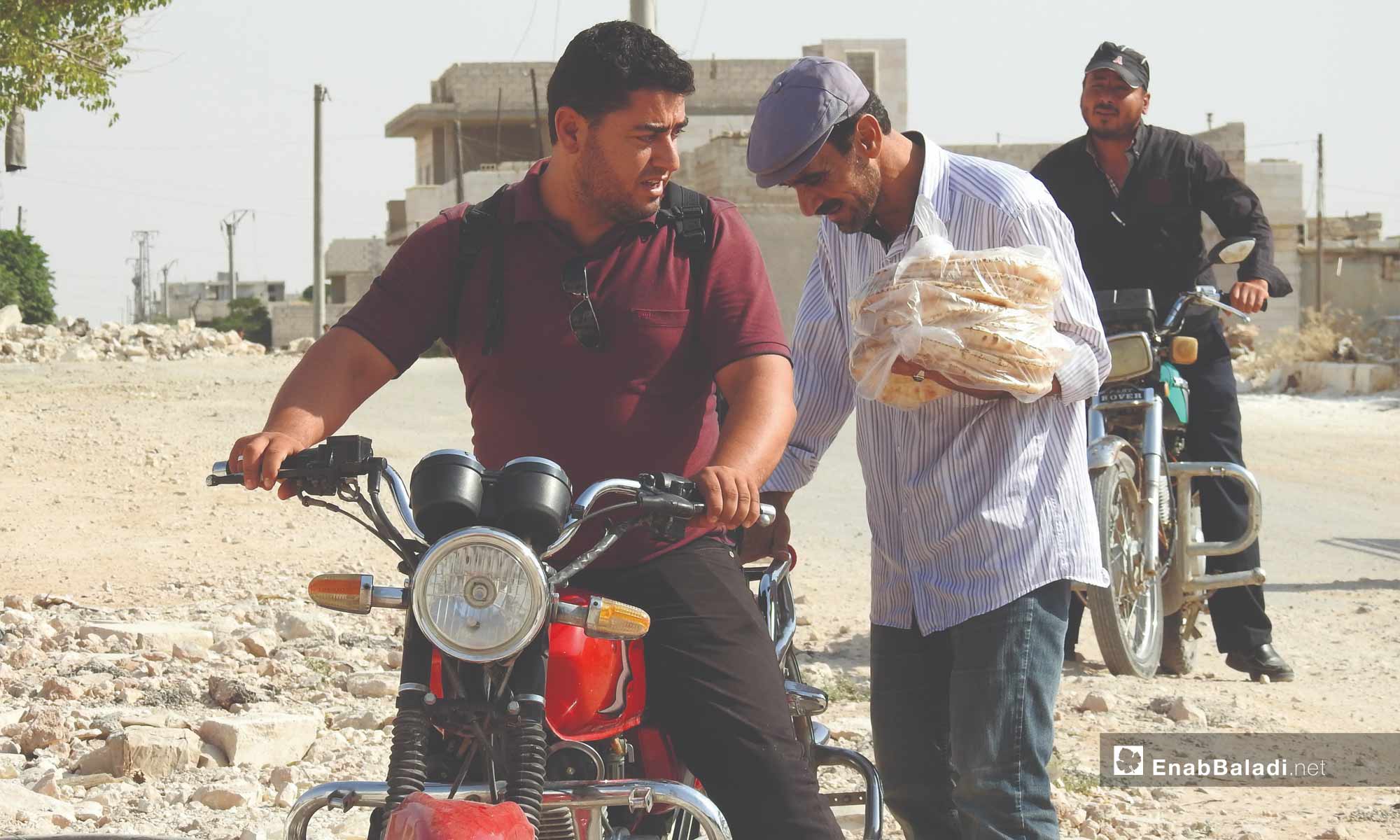
Citizens benefiting from an automated bakery in Bizaah in the countryside of – July 2017 (Enab Baladi)
Al-Hasakah Governorate… Three-side Support
| The price of three packs of bread in the automated bakeries belonging to self-governance or the regime’s Baath bakeries in al-Hasakah is estimated at 200 Syrian liras.
In contrast, the price of one pack of bread in the other semi-automated bakeries reaches 200 Syrian liras. Adding to that, the bread is of high quality in most of these bakeries. However, UN-backed bakeries offer the pack at 50 Syrian liras. |
The “self-governance” areas in eastern Syria contain dozens of automated and semi-automated bakeries. The automated bakeries are owned and supported by the self-governance administration. In contrast, there is one automated bakery in Al-Hasakah Governorate belonging to the Syrian regime’s government that supports it by flour and fuel.
As we were unable to officially contact the self-governance administration, Enab Baladi was told by local sources that semi-automated bakeries are owned by the region’s merchants and supported by the self-governance administration with flour and fuel. They are the most popular among the population for the high quality of their production despite their high prices.
The mills in the region, such as al-Jazeera mill and others are the source of supply for the bakeries. The General Council of Self-Management buys wheat harvests directly from farmers in the areas under the council’s control, so that the grain is distributed to mills and bakeries.
On the other hand, the United Nations is contributing in the process through providing the bakeries, which exist in the Eastern part of al-Hasakah, and which are private properties and operate semi-automatically, with flour in order to produce high-quality and inexpensive bread. The UN flour aid is considered as a form of international assistance to the population in that region.
According to sources, the flour is conveniently available in the areas controlled by the General Council of Self-Management. However, the different specifications of each bakery and the ingredients used to make bread diversify the bread’s quality and price in a significant and noticeable manner.
Survey: Public bakeries are still the primary bread provider in Syria
A survey conducted by Enab Baladi showed that Syrians still rely on public bakeries for bread.
In a question on Enab Baladi’s Facebook page, about 650 users revealed their sources of bread. 78 percent of the survey’s audiences were in favor of public bakeries, while 22 percent of the respondents bought bread from private bakeries.
Although voters agree on the decline in the quality of bread made in public bakeries, the prices employed by private bakeries force them to accept the first option.
Flour determines the quality of bread
The quality of bread is a daily subject for discussion among many Syrians in different areas, mainly due to the quality of the flour used in bakeries.
In the north, bread is currently of high quality compared with the pre-2011 years. Such improvement is rendered to the use of improved substances such as sugar, the mahaleb cherry, and other ingredients that refine the quality of bread and improve the way it tastes. However, adding these ingredients to the bread increases the production expenses and the financial burden undertaken by bakeries’ owners.
Hence, in areas dominated by the Syrian regime, the bakeries’ owners complain about the poor quality of imported flour, the one extracted from Russian wheat for instance, which must be mixed with better types of flour to make it suitable for bread making.
A bakery owner in Damascus, who asked not to be named for security reasons, said in an interview with Enab Baladi that the poor quality of bread is the result of two factors: first, the occurrence of flour beetles and the lack of sterilizers in the wheat silos in Syria. The second reason is the presence of bran in the flour and the bakeries’ inability to completely sift the flour, which is a challenging procedure, according to the owner of the bakery. The owner confirmed that bakeries’ managers in Syria have no saying in determining the type of flour supplied to them or the mills responsible for preparing the substance. Such affair is regulated through the Directorate of Supply which operates in accordance to its allocations, except for cases when bakeries manipulate the amounts of bread production and smuggle flour.
Regarding the quality of bread in private bakeries, extra ingredients are added in order to improve the taste of bread, such as sugar, milk, and the mahaleb cherry, etc. These substances boost the dough’s quality before being placed in the oven. However, the use of enhancers adds up the price of bread, on the other hand.
In the zones taken in charge by the General Council of Self-Management, automated bakeries produce a bread of poor quality, as it mixes flour with bran. However, semi-automated ones have a high-quality production as they use white flour.
Bread: A red line
“Bread is a red line and must be subsidized”, a saying that has been repeated frequently by Syrian officials over the years, aimed at reassuring citizens. This type of official discourse is considered by some economists as a means to “maintain social peace”.
Government subsidy for any commodity is one of the most influential and important forms of support for the citizens’ standard of living. The Syrian government offers financial aid to lower the prices of goods either for the benefit of a specific industry or in favor of the population. The most significant commodities, which are supported by governmental subsidy, are wheat, sugar, milk, electricity, and fuel.
Bread subsidies are a priority to any government, regarding its vitality for citizens’ livelihood, but in Syria, bread prices have risen after 2011. As such, the Syrian regime’s Internal Trade and Consumer Protection Ministry has raised the price of bread per bundle from 15 to 25 Syrian Pounds in July, 2014, and from 25 to 35 Syrian Pounds in January, 2015, afterward, in November of the same year, the bundle’s price went up to 50 Syrian Pounds.
However, government officials are still mentioning commodities’ subsidy, especially for bread. In November 2017, Finance Minister, Mamoun Hamdan, said that the government pays a billion of Syrian Pounds each single day to support bread prices.
Last April, according to Al-Iqtisadi local news website, the value of the ration deficit resulting from subsidizing bread amounted to 378 billion Syrian Pounds annually. The website pointed out that the authorities support this commodity by 150 Syrian Pounds per bundle. Thus, the cost of making a bundle of bread exceeds 200 Syrian Pounds while it is sold only for 50.
But rumors about lifting subsidies on bread have begun over the past months, coinciding with news of a close increase in salaries for government employees. Such news raised the population’s concern about a potential lift of subsidy due to wage enhancement.
Hence, popular fears where deepened when the Finance Minister told the local newspaper, Al-Ayam, last September, that the Syrian authorities are able to increase wages by a 200-percent rate, but on the condition of cancelling governmental subsidies.
Hamdan clarified, saying: “The State of Syria is able to raise salaries, but there is a social support system that is provided not only to employees, but also to all citizens. This support mechanism is enough to increase the salaries by a 200-percent rate or at least by more than 100 percent. The government is able to do so if social subsidies are lifted, and we mean by that the subsidies of bread, electricity, and oil only”.
Brokers multiplied the price of bread
The term “brokering” is not limited to real estate, cars and goods, but rather gained an additional aspect within the territories controlled by the Syrian regime. The implementation of this new brokering trend has begun by manipulating the prices of bread.
The overcrowding on bakeries is the main reason for the emergence of brokering, which was associated with individuals with limited authority, including elements of the National Defense forces. Those security personnel tend to buy bread from bakeries and sell it to citizens at double prices, taking advantage of the fact that they do have an easy access to the commodity without being obliged to stand in long lines. Such aiding factors contribute significantly in the flourishing of bread brokering activities.
The phenomenon has expanded to include all the provinces controlled by the Syrian regime and have been taking place in Damascus, Aleppo and Lattakia recently. Such unlawful activities have been transformed into a new trade system that generates significant profits for the people working in it. The profiteers of the novice trade wave lure the bakeries’ owners by paying them a higher price for bread, compared to regular prices, on the sole condition to provide the required quantities needed by brokers.
The price of the bread bundle is 50 Syrian Pounds in the bakery, while the outside sellers and brokers sell it for 100 Syrian Pounds and sometimes up to 150. In some other areas the bundle’s price reaches 200 Syrian Pounds. These practices are rather concentrated in rural areas where governmental control is less tight than in the cities.
Public bakeries’ selling activities in Syria are mainly directed to citizens, in addition to the bread supplies provided to accredited vendors, who in turn sell the bread in their shops at a regular price that may rise from five to ten Syrian Pounds.
An accredited bread vendor from Homs, who asked not to reveal his identity, told Enab Baladi that the bakeries’ owners in the city are selling bread on a daily basis to people who are not registered in the directories of supply at prices that exceed regular direct selling rates from 50 to 75 Syrian Pounds. Such practices are significantly profitable.
The vendor added that accredited sellers are also employing these unregulated methods. They sell bread with quantities which exceed regular rations, in addition to getting some quantities of flour and sell it in shops, employing elevated prices in case of kneading, baking before selling .
Over the past two years, Syrian citizens have called for limiting the spread of such phenomenon, and some of them expressed, through social media platforms, that the solution for this crisis is to increase the number of trade measurement inspectors, activate a market observance program, and punish violators.
As a reaction from the government’s part against the phenomenon of brokering, Internal Trade and Consumer Protection Ministry announced last year the implementation of stalls in front of bakeries to put an end to unlawful activities led by brokers and vendors.
Ziad Hazaa, CEO of the General Company for Bakeries (GCB), told the local newspaper Al-Watan that “these stalls will substitute sellers and brokers who take advantage of overcrowding in front of bakeries, especially at peak times”.
Hazaa highlighted that a bread bundle will be sold for a fixed price (50 lira per bundle). He pointed out that bread stalls will be deployed in areas witnessing high demand for bread.
A journalist from the city of Aleppo, Waleed al-Jaber, previously tackled the issue of brokering through his Facebook account. He stated that this phenomenon has been “growing, developing, and expanding until it has become a phenomenon that must be stopped because of its direct impact on the largest segment of society”.
Al-Jaber added that despite all the measures taken by the government of the regime in order to secure bread for the citizen through increasing flour supply, working hours and others. However, there are still those who are working to hinder these measures in order to force the citizen to leave the long line and resort to brokers.
According to the journalist, brokers are selling bread for a price that would guarantee up to 200 percent of profit for them. Public bakeries sell 14 loaves for 100 Syrian pounds, and the broker sells the same amount for 300 Syrian pounds.
The situation in opposition-held areas differs, for some of the bakeries there are subsidized by organizations and local councils and others are private.
According to the correspondent of Enab Baladi in Idlib, the activity of the phenomenon of brokering coincides with the interruption of the activity of subsidized bakeries. Some traders resort to selling the bread they get from the private bakeries and those subsidized by local councils in order to meet the needs of the areas, which are covering in case the activity of these bakeries were stopped or disrupted.
The correspondent highlighted that some of the bakeries, which belong to the local councils are selling the amount of bread they produce in grocery stores. However, they share a limited which amounts to no more than ten Syrian pounds.
Is raising bread prices an indicator of inflation?
Raising the price of bread from 15 in 2011 to 50 Syrian Liras In 2018, urges economic analysts to consider this as a sign of the high inflation that hit the Syrian market.
However, economic analyst Younes al-Karim believes that bread, mainly wheat, is not considered as an essential element in the calculation of inflation, but rather considered as a basic commodity, along with several other commodities (such as fuel). The inflation rate is calculated only according to these criteria but the case does not apply to Syria.
Bread is considered as one of the substances that contribute to the so-called “emotional inflation”, that is the citizens’ regretting the high quality of bread that was previously provided, in addition to the scarcity of wheat-based material, such as sweets and “breadsticks” which became one of the wishes for the citizen. This situation triggers emotional deficiency because his Syrian currency does not meet his wishes.
The price of the bread produced by private bakeries is not fixed, and may sometimes reach 250 to 300 Syrian pounds.
Russia ousts Iran from mills’ investment
Russian culture is rich in dozens of proverbs, which emphasize the need for bread in the life of any citizen, including “Bread is a father, water is a mother “, “Don’t drive your horse with the whip – use the oat bag,” in reference to how important and strategic this basic commodity is.
Russia has worked to control the joints of strategic material in Syria in recent years, through the construction and control of mills, or by supplying hundreds of thousands of tons of wheat to Syria after deals it had concluded with the regime which has to import the material from Moscow in exchange for political and military support provided by Moscow, which prevented the regime from collapsing.
From Turkey to Iran and then Russia
In 1975, the Syrian government established the General Flour Milling Company in order to manage and invest the mills, receive the grain, process the manufacture, distribution and sale, receive the imported flour, store it and deliver best quality materials to the bakeries.
The mills remained under the authority and investment of the Syrian state during the rule of former President Hafez al-Assad. However, after his son Bashar took over power he granted the Turkish companies the right to equip and establish it, but without having the right to invest or do anything else. This was a kind of “favoritism”, especially after the relationship between both countries has been improved and economic agreements have been signed between both countries during the years which preceded the revolution, according to economic analyst Younes al-Kareem.
After the revolution, the Turkish companies refrained from completing their expansion plan, which targeted the mills, to be replaced then by Iran. The contracts were signed at the end of 2012 and the beginning of 2013 to reinvest the mills, but this time Tehran clung to the right to re-invest in the mills.
“In 2013, the government signed a contract with Iran to fully equip five mills in several areas in addition to buildings. This project was worth 62 million Euros,” said Abu Zeid Ketiba, director general of the General Flour Milling Company, to the local newspaper Al-Watan in 2013.
However, with the Iranian incursion into the Syrian mills, Russia has quietly begun to compete with the government in 2013 to build Tell Kalah mill capable of producing 600 tons per day, which is worth 16.5 million Euros. After that, it began to reveal its ambitions for the mill sector. In September 2014, Sovocrim expressed its willingness to repair all damaged mills and silos for a law cost, according to the newspaper Al-Watan, which quoted the General Secretary of the Russian company, Nidal Mohammed Ahmed, as saying that “this is considered as a move expressing good faith from this company to the Syrian state.”
After the Russian intervention in September 2015, the contracts for the construction of the mills were withdrawn from Iran and granted to the Russians. Several low-productivity mills in the areas of as-Suwayda and Deraa were exempted from the contract, because there were no Russians and Iranian active militias there. However, after Russia intervened in southern Syria and established control over the region, Russia has seized the right to invest.
In February 2017, Sovocrim announced the construction of four grain mills in the Syrian province of Homs for 70 million Euros. The construction will be carried out in cooperation between Russian and Syrian engineers and the Syrian government will cover construction costs.
Controlling the Syrian State through wheat
Observers of Russian policy in recent years notice that it is trying to acquire and control several sovereign economic sectors in every region it visits (including wheat, transport, etc), which makes it control the region, according to Kareem, who set three goals he believes Russia is seeking to achieve by controlling the mills.
The first goal is to create an economic ideology that controls the areas it has already seized, to bring it under its control, and to fight any other ideology, national or religious, and thus Moscow seeks to control the livelihood in the region to subjugate it.
The second objective is Russia’s attempt to make Syria a gateway to the grain industry and trade in the Middle East and to compete with American grains; especially that Syria’s position is strategic and that what is expensive about grain is transportation and milling. Syrian wheat is of high quality and suitable for Middle Eastern food and products. Russia is trying to control the cultivation of grain through which it can penetrate these markets, according to Kareem.
The third objective is to try to control the Syrian State by controlling wheat and mills. Cereals are one of the basic ingredients to control any country. Russian control of the mills implies controlling the livelihood and an important financial resource for the Syrian State, as a result, making the country susceptible to future food and financial deficiencies and subsequently dependent and loyal to Russia.
if you think the article contain wrong information or you have additional details Send Correction
النسخة العربية من المقال
-
Follow us :












 Children carrying bread in the morning in the city of Idlib - January 17 (Enab Baladi)
Children carrying bread in the morning in the city of Idlib - January 17 (Enab Baladi)





 A
A
A
A
A
A
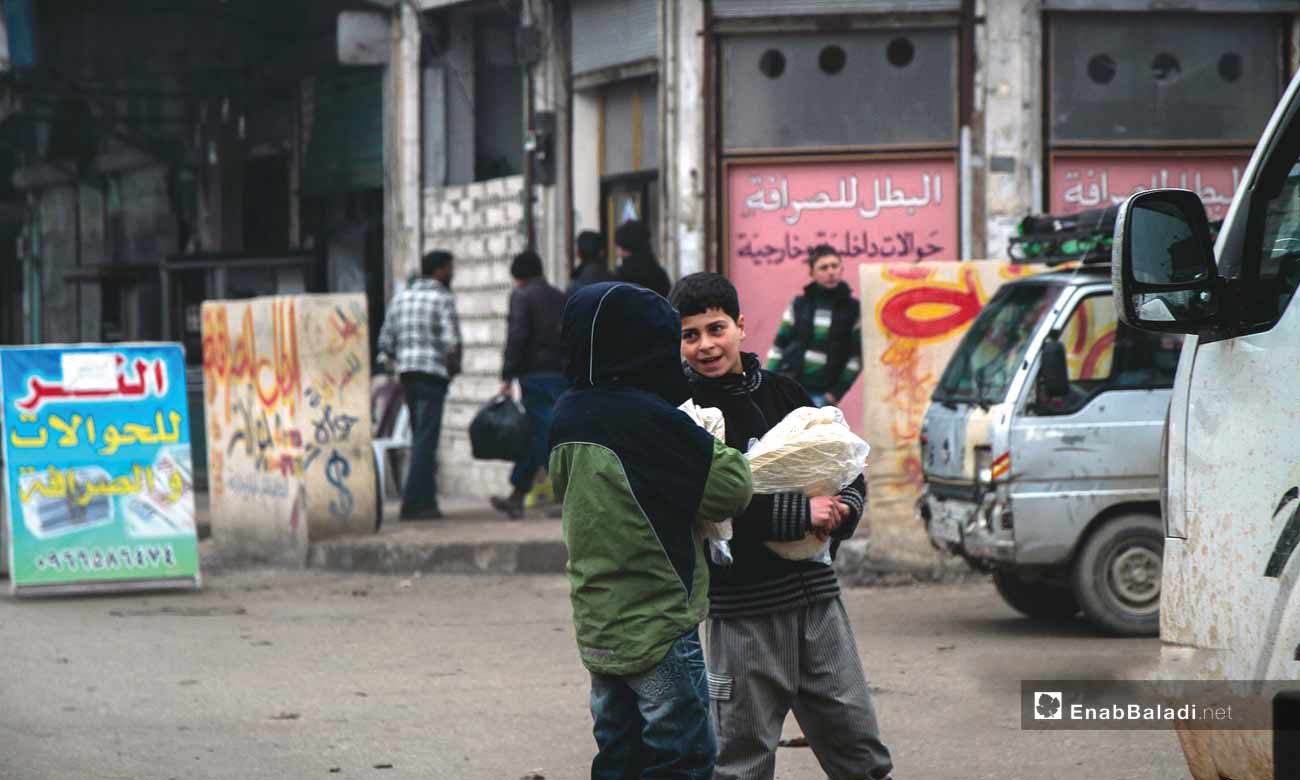
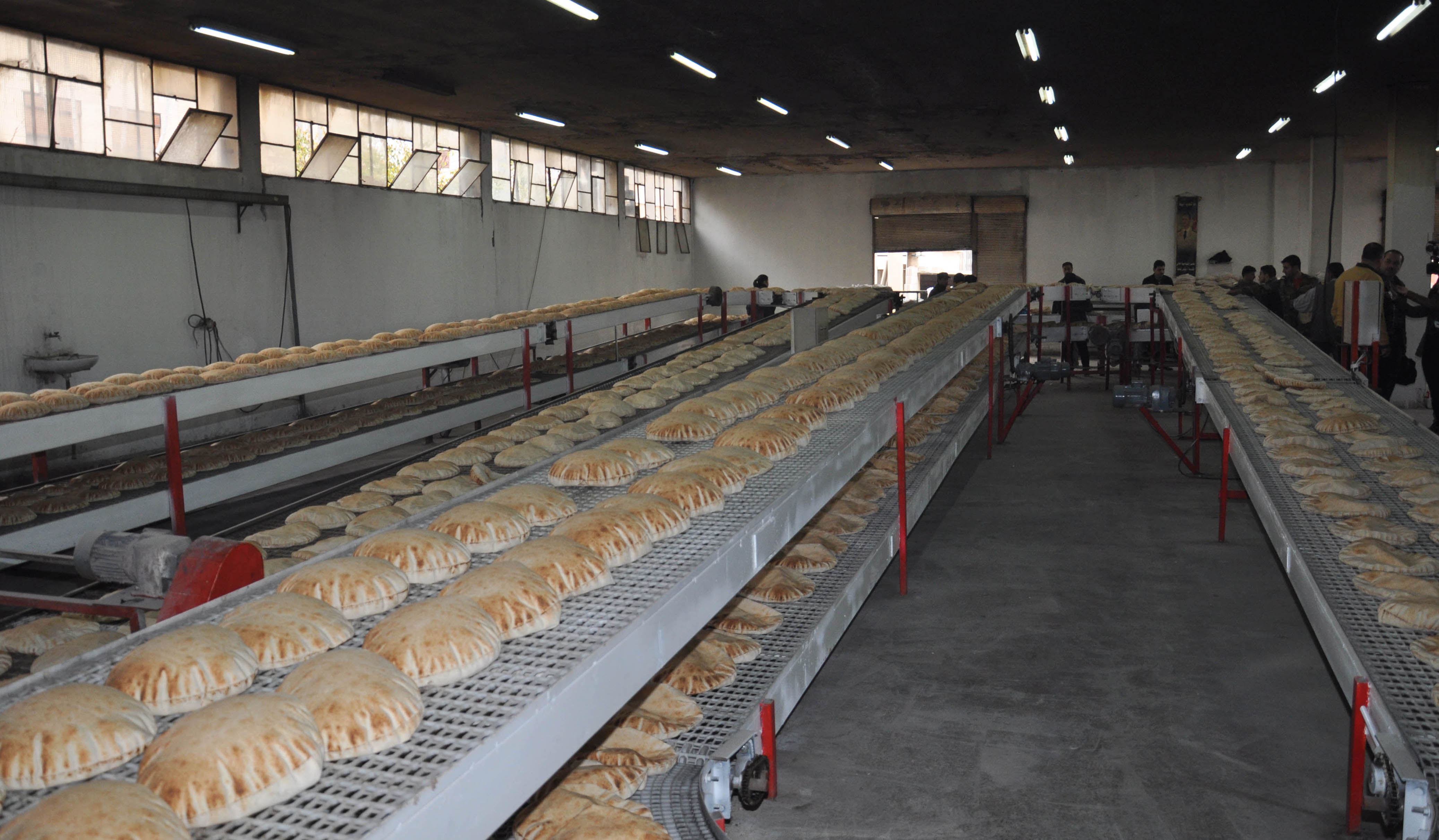
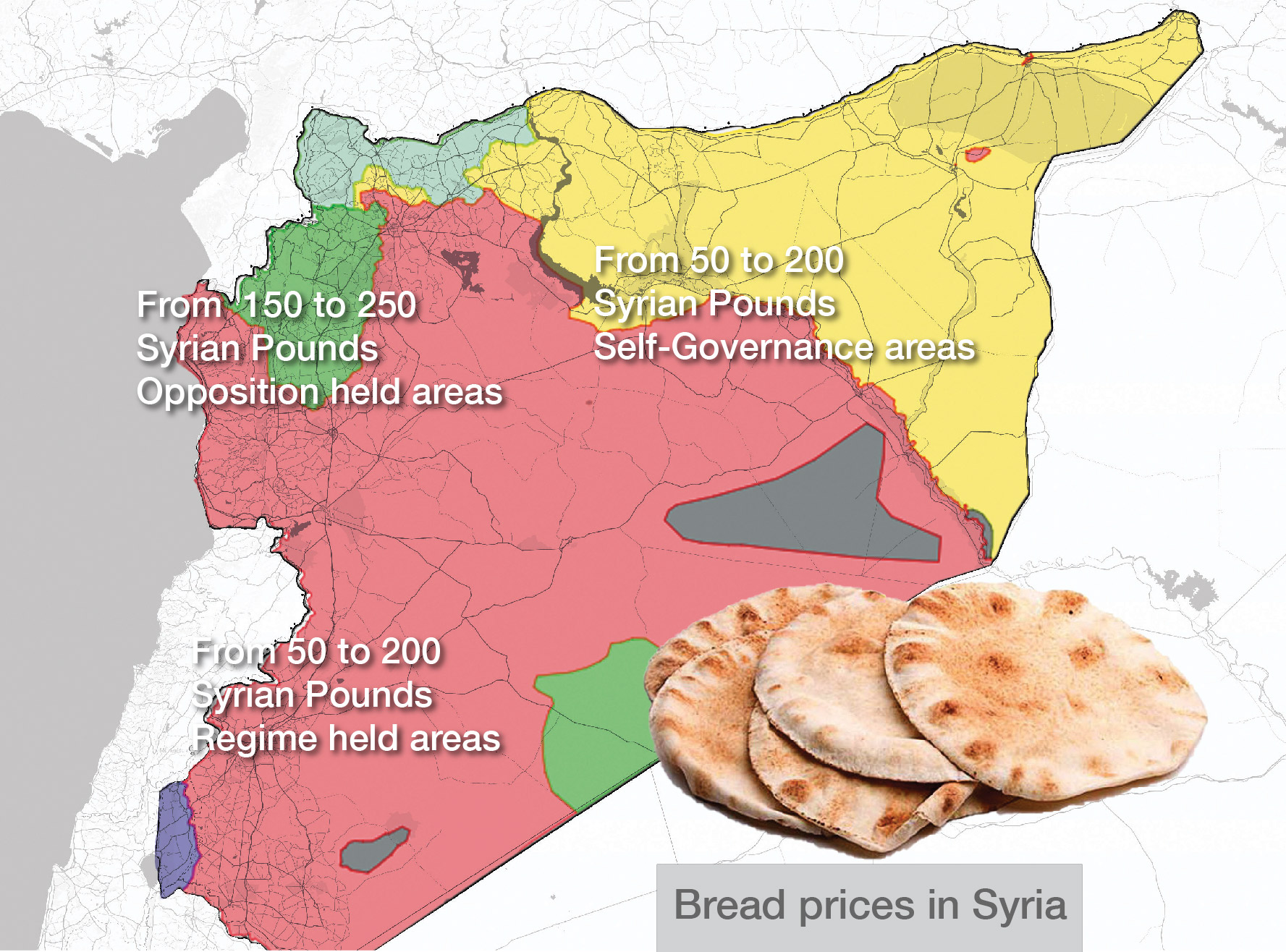
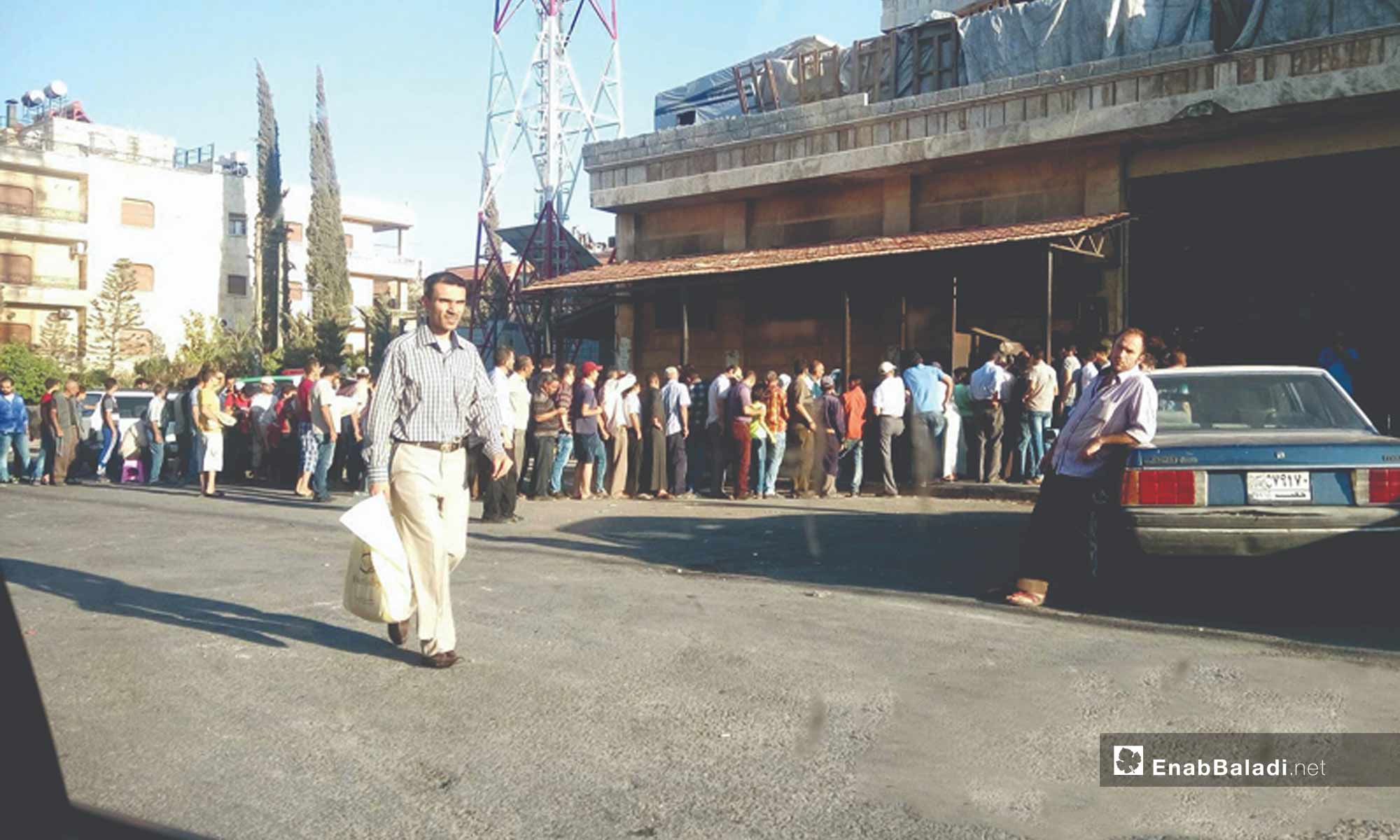


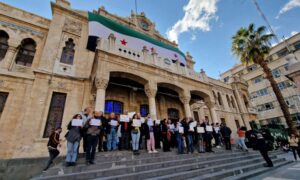
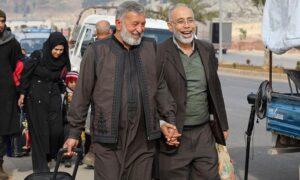



 More In-Depth
More In-Depth